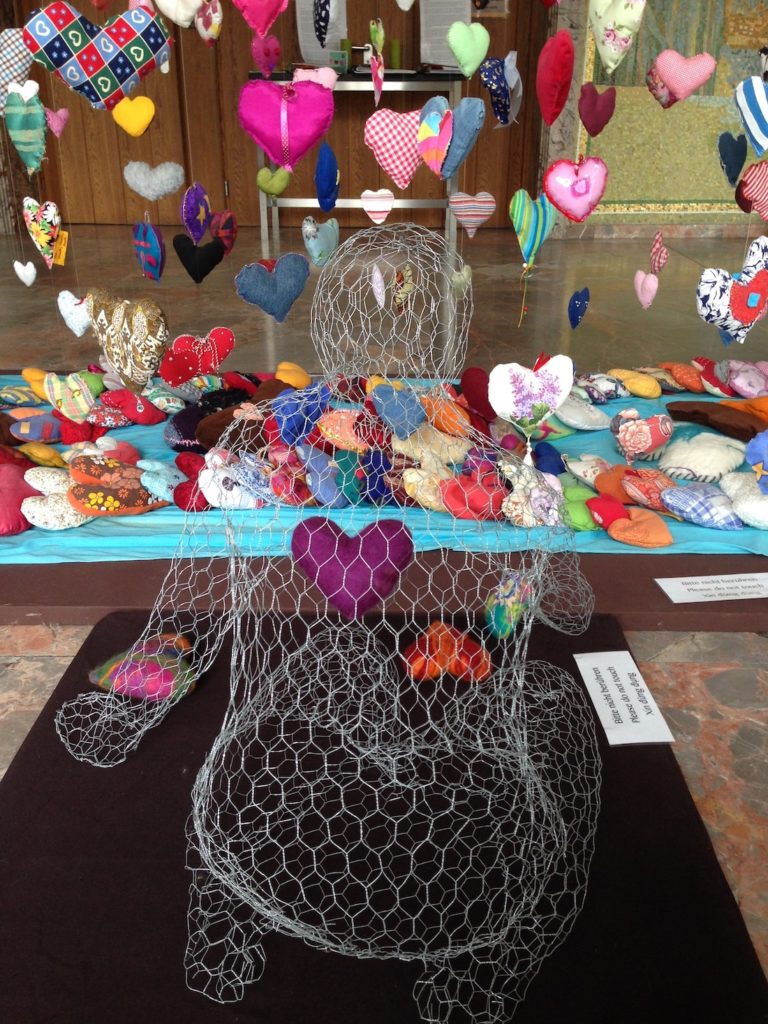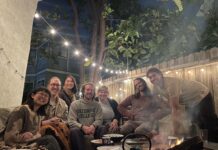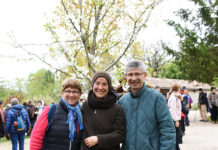Written by Brother Pháp Nguyện (Br. Aspiration)
Translated by: Chúc Mai
This year, An Bang retreat was held at Moc Lan Monastery from July 18th to July 21st, 2019 under the theme of “Understanding and Love.” We had more than 250 people attending the retreat. Members of An Bang Abroad Association worked hand-in-hand with our monks and nuns to guide the participants in the four-day retreat. The Vietnamese friends who came here to practice were able to speak Vietnamese, ate Vietnamese food, played Vietnamese folk/cultural games, and the children were able to play with monastics and their peers; thus, adults and youth were all delighted.

During the Questions & Answers session, a middle-aged gentleman bravely stood up and asked a question. He said, “This question belongs to our young friends who have asked me to present it: How can we overcome ‘singlehood’?” (In the context of this question, singlehood refers to a woman or man who is past the prime age for marriage.) Looking towards the back of the meditation hall, I saw a group of young adults from ages 25 to 35 giggling with bashful faces. In a solemn atmosphere of the Q&A session inside the meditation hall, I felt so much love for them. It is a real situation many young people have to encounter today, especially in this age group.
The question: how can we overcome ‘singlehood’? To me, this topic has many aspects to be concerned about. Here, I would like to address only three concrete aspects based on my own life experiences and practice: recognizing and embracing emotions, the beauty comes from within, and cultivating happiness.
Recognizing and embracing emotions
First of all, we have to find out where the causes of our problem are coming from. The notion of “singlehood” is a state of disguise of a fearful mind. Within each of us, we all have a seed of fear. More or less, big or small, everyone possesses that seed. We worried because we have passed a certain age and no one is going to love or marry us. If so, then we will live in solitude for the rest of our lives. However, if we look deeply into that feeling of fear, we can see that the loneliness is not something that ‘will’ happen, but it is happening right now in our daily lives.
Because of loneliness and emptiness, we have a fear of “singlehood” arising in us. If a person is living a happy and fulfilled life, then surely they will not have the thought or fear of “singlehood.” Therefore, we must have the ability to recognize our true feelings or emotions. In the language of Plum Village, we must call it by its true name. What is its name? Is its name worry or fear? When a person is ill, the doctor must know the correct diagnosis to prescribe the right medication for treatment.
I remembered the good old days before I became a monk. Sometimes, I worried and contemplated about this issue. I entered college when I was 18 years old, graduated at the age of 22, and worked arduously for nine years until I became a monk at the age of 31. In the course of studying and working, because I was so busy, there were times I forgot my body and mind. I was also a young individual living in a life like yours. I also had suffering, low self-esteem, sadness, and passion. Therefore, I can empathize with your feelings at this time.
When our desires or projects have pursued, then we start to feel lonesome and empty. At that moment, we have an urge to seek “a lover,” a reliable person to fill the void for us.
In today’s world, I understand that young people need to put an effort and try extremely hard to have a place in society. In the growing-up process, we set goals for ourselves: obtaining a degree, having a reputation, and with all our might, happiness for us to depend. Therefore, we are not capable of living with the wonders of life and the conditions of joy we have in the present moment. That goal could be a bachelor’s, master’s, or doctorate degree. After completing our studies, we exert our energy to search for an excellent job that is compatible with our degree we have studied so hard.
We have invested much of our youth in this part of our lives. In the process of learning and working, we may feel passionate and occupy with the projects we are pursuing. Then, we allow all the tensions to slowly destroy our body and mind. Moreover, we do not have time to pay attention or observe our mixed emotions of joy and sadness; meanwhile, our psychological state is changing abnormally.
If we do not know how to examine them, then they will take control of us. Not only we have to deal within, but we also have to face what’s outside of us. There are times when the feeling of sadness arises; we don’t know how to solve or take care of it. We suppress it by going out, watching movies, consuming alcohol, using drugs, ingesting food, or shopping to relieve our sorrow. When our desires or projects have pursued, then we start to feel lonesome and empty. At that moment, we have an urge to seek “a lover,” a reliable person to fill the void for us.
Those mentioned are the projects we can pursue smoothly, but after achieving them, we then feel empty and lonely. But there are also many other situations, such as in the process of pursuing a project. We may encounter many challenges, difficulties, and sufferings. There are times when life is not as easy or smooth as we may think. In times of hardship and sorrow, we feel empty and desolate. We believe we need someone to love—someone who loves us and understands us so we can lean on and confide in them. For that same reason, we aimlessly wander and search for “that person.”
Who is that person? Is it the soulmate whom we have been looking for? Those we have met, perhaps in the first few days or the first week or the first month, we may feel compatible. But after that, we discovered many new and different things about that person. Then, we sense the incompatibility; thus, we part ways. After the separation, we continue the journey of seeking, because the void gets larger and larger every day. The more we search, the more we feel the distance, the exhaustion, and the desperation.
At that time, there is fear within us—a secret fear that we are in “singlehood.” But, are we really in “singlehood” or are we just feeling lonely? When we find a loved one as we dreamt of, then will we be able to end our loneliness? I have known people who are married or dating someone they cherish, but they still feel empty, desolated as usual because they are not able to share their burdens, concerns, and deepest aspirations with each other.
There is a saying in Vietnamese, “Đồng sàng dị mộng.” It means even though we are sleeping in the same bed, we have different dreams. In other words, while living together, we do not understand each other; thus, we are heading in a different direction. Therefore, a lonely soul seeks another lonely soul. The loneliness will not diminish; instead, it will multiply. In my opinion, what we can do to recognize, embrace, and transform that lonesome seed within us is the ultimate solution.
Are we really in “singlehood” or are we just feeling lonely?
Dear friends! As a human, everyone desires to be understood and loved. But understanding and love must start from oneself. In Vietnamese, the word “tri kỷ” literally means soulmate. However, the word “tri” means to know, to understand, and to comprehend deeply. The word “kỷ” means ‘self.’ Hence, “người tri kỷ” or a soulmate is someone who knows and understands us profoundly. But who else may know and understand us better than ourselves?
If we still do not understand or love ourselves, how can we ask others to understand and love us? We should ask ourselves, “How much have I understood and loved myself?” Are we able to recognize, embrace, and take care of the emotions within us? Do we have the capacity to sit in stillness so that we can be present and embrace the pain in our physical body?
In Plum Village, we practice mindfulness meditation. Mindfulness is an energy that helps us to be aware of what is happening in our body, mind, and our surroundings. It helps us to be truly present in the now, and deeply interact with the miracles of life. Breathing and footsteps are the two effective tools for generating this energy. Breathing in, we know we’re breathing in. Breathing out, we know we’re breathing out. When we breathe mindfully, in that consciousness, we are truly present with the breath, with life and with what is happening in our body and mind.
Conscious breathing also helps us stop the anxiety, sadness, or anger in us. Breathing in, we are aware we are feeling lonely and empty. Breathing out, we smile, or we embrace our loneliness and emptiness within us. Practicing mindfulness helps us to recognize our feelings or emotions in a very truthful way. When we acknowledge the presence of our senses, we use the mindfulness energy to embrace those feelings. If we practice continuously for a few minutes, then those feelings will slowly subside. The wind comes and goes; so is the breeze of our emotions; it comes and goes. However, if we do not know how to recognize and embrace our emotions, then we will be drifted far away.
Beauty comes from within
When we encounter an individual who looks attractive or cute, we hastily fall in love, even though we have not had a chance to converse or interact. Perhaps, that person has a charming smile or sparkling eyes. Her external beauty, as well as her charm, has taken our souls away. In the West, there is a saying, “Love at first sight.” We secretly have a crush. But have we ever asked the question: “Is it possible to love someone that is based solely on his or her appearance? What about his or her dignity, morality, values, family, and education?” If love depends only on an outward form, then that love would be very fragile and treacherous. As we all know, many love affairs shattered because we were chasing after the external beauty.
Typically, when we love someone, we only see the positive things about that person, until we have the interaction, we discover many negative things about him or her. At that moment, we became disillusioned. Because what we saw in the past was all beauty, but now it is all unappealing. In the poem ‘Mộng Dưới Hoa” by poet Đinh Hùng, there is a line: “When I haven’t made the acquaintance yet I pondered. There is a young lady as beautiful as the painting.”
It sounds so romantic, isn’t it? But what about after we met? At Plum Village, I have heard from young people who came to our practice center and confided: “Now we have made the acquaintance, the young lady is as mean as…” Now that sounds so harsh, right? That is what is happening in the world of young people today. In my opinion, the situation is not so bad if our young friends learn to love genuinely—do not allow your passion to control you. Love is a vital source. It’s nourishing and a necessity in life.
Do not allow your passion to control you. Love is a vital source. It’s nourishing and a necessity in life.
Without love, life is dull and tasteless. We must learn the art of loving so that it is not destructive and at the same time we can maintain the freedom for each other, that is what we call True Love. Zen Master Thich Nhat Hanh skillfully taught us about this topic. True love must be made with the substance of understanding and love. We must learn the motto of “crossing the bridge of understanding, then we will arrive at the bridge of love.” If we do not understand that person, then it is impossible for us to truly and completely love that person.
Meanwhile, true beauty must come from within. If we want to obtain this beauty, we must know how to practice, cultivate, and nurture. Have you ever seen and interacted with the young monks and nuns? Those who had an opportunity to visit Plum Village or our affiliated centers know that monks and nuns walk, stand, sit, cook, and wash dishes in a very peaceful and gentle manner. All movements are in mindfulness.
The young friends who come to Plum Village love and respect the monastics. They love and respect not due to the external beauty or aura, but the beauty radiating from the inside. A nun speaks adorably, not because she converses in words of grace, but because she communicates with mindfulness and with all her heart. It means the nun knows what she is saying, knows how to use loving words, and speaks calmly and slowly. A monk, too, acts very gentle and with compassion. It is an art. This art is not naturally present, nor it can be sold in supermarkets. We have to learn and practice in order to acquire it.
In Plum Village, all monks and nuns have to learn solemnity and cultivating love through mindfulness practice. When a person knows how to generate beauty from the inside, then that beauty will naturally shine outward. Thanks to that practice, others also inherited the benefits. Therefore, creating inner beauty is the same as generating love. When a smile lit up, people can feel joyous and happy. When one speaks mindfully, the listeners can also feel faith, hope, and nurture. An act of compassion can also make others feel warm and affectionate. Over the past forty years, Zen Master Thich Nhat Hanh has developed this mindfulness practice thoroughly to help us reduce suffering and to have more happiness in our daily lives whether we are lay people or ordained monks and nuns. We all can implement this practice in any situation, time, and place.
Cultivating Happiness
One night, there was a bright moon at Deer Park Monastery. Our brothers and sisters decided to go up on a mountain to have some tea and watch the moon. That night was the sixteenth moon (lunar calendar)— the moon shines brightly in the sky. We sat quietly and drank tea in silence; no one uttered a word. We were drinking tea, watching the moon, and cherishing each other’s presence. The scenery, where we sat and drank tea in silence, was very majestic. At that time, I felt a peaceful energy entering my body, and I felt incredibly joyous. It was a state of serenity, lightness, tranquility, and happiness.
In the past, not knowing the practice of mindfulness, I was confused between sensual pleasure and peace. I thought that happiness meant satisfying my desires. How can we fulfill our desires?
In the past, not knowing the practice of mindfulness, I was confused between sensual pleasure and peace. I thought that happiness meant satisfying my desires. How can we fulfill our desires? Greed is bottomless. One desire fulfilled, then we generate another bigger desire. Ultimately, we are being enslaved by our desires, whereas peace is the joy of inner stillness. Joy is present when there is no desire in our heart. Joy that arises from within. Joy that was created by us.
If we observe carefully, we will see that from the pursuit to the attainment of the desire, the joy we receive is far less than the afflictions that brought upon us. The greatest joy that we possess is the time that devoid of desire. That is the gap when one desire ends, and a new one arises. For instance, when I was working, during the first few months, I was trying to be frugal and saved money for a “trendy” car. I was thrilled after I bought it. I was proud of my achievement for a few weeks; after that, I set a new goal to buy a house. The joy of having a car slowly dissipates, and it replaced with new endeavors, new concerns, and the anxiety to have the funding to purchase a house.
When seeking for external pleasures such as traveling and fine dining in luxurious places, it will only satisfy the body. While in the depth of the mind, difficulties, sadness, loneliness, or pressure are still being suppressed by the temporary external joy. Sensual pleasures are only able to give us transient happiness, and then they cause our cravings to be immense. In the past, I often planned for the future, so I consistently worked. I had lost those wonderful present moments. After I became a monk, I discovered that happiness is what is already available within me. I don’t need to travel far to find it. If we want to realize it, we must be mindful.
When we practice, and we have peace and happiness, it means that we are experiencing the joy of Dharma. Thus, naturally, our desires or fears gradually vanish. We will have more confidence. At that moment, we will not need any external conditions to help us attain happiness, because now we know how to create happiness for ourselves. Therefore, ‘singlehood’ or ‘non-singlehood’ is just a notion but not a problem, because now we know how to be our own soulmate. When we take a solid step, we feel free. When we take a gentle and deep breath, we feel that our spirit is completely relaxed. When we drink a cup of tea in mindfulness, we also feel peaceful and joyful. And when we have stability and peace, we will be a refuge for many people. May you all have peace and joy in your practice and explore your spiritual path so that you can be more steady in your life.



















